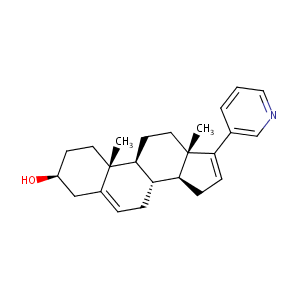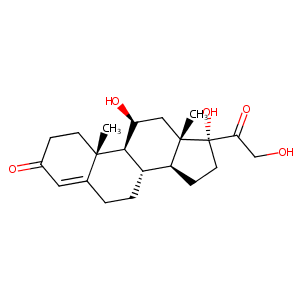| 1 |
ClinicalTrials.gov (NCT03548246) Androgen Reduction in Congenital Adrenal Hyperplasia
|
| 2 |
URL: http://www.guidetopharmacology.org Nucleic Acids Res. 2015 Oct 12. pii: gkv1037. The IUPHAR/BPS Guide to PHARMACOLOGY in 2016: towards curated quantitative interactions between 1300 protein targets and 6000 ligands. (Ligand id: 6745).
|
| 3 |
Hydrocortisone FDA Label
|
| 4 |
URL: http://www.guidetopharmacology.org Nucleic Acids Res. 2015 Oct 12. pii: gkv1037. The IUPHAR/BPS Guide to PHARMACOLOGY in 2016: towards curated quantitative interactions between 1300 protein targets and 6000 ligands. (Ligand id: 2868).
|
| 5 |
Hydrocortisone for COVID-19 and Severe Hypoxia (COVID STEROID)
|
| 6 |
Clinical pipeline report, company report or official report of the Pharmaceutical Research and Manufacturers of America (PhRMA)
|
| 7 |
2011 FDA drug approvals. Nat Rev Drug Discov. 2012 Feb 1;11(2):91-4.
|
| 8 |
A fission yeast-based test system for the determination of IC50 values of anti-prostate tumor drugs acting on CYP21. J Enzyme Inhib Med Chem. 2006 Oct;21(5):547-56.
|
| 9 |
Elucidating mechanisms of toxicity using phenotypic data from primary human cell systems--a chemical biology approach for thrombosis-related side effects. Int J Mol Sci. 2015 Jan 5;16(1):1008-29. doi: 10.3390/ijms16011008.
|
| 10 |
Targeting CD46 for both adenocarcinoma and neuroendocrine prostate cancer. JCI Insight. 2018 Sep 6;3(17):e121497. doi: 10.1172/jci.insight.121497. eCollection 2018 Sep 6.
|
| 11 |
Targeting chromatin binding regulation of constitutively active AR variants to overcome prostate cancer resistance to endocrine-based therapies. Nucleic Acids Res. 2015 Jul 13;43(12):5880-97. doi: 10.1093/nar/gkv262. Epub 2015 Apr 23.
|
| 12 |
Hydrocortisone enhances the barrier properties of HBMEC/ci, a brain microvascular endothelial cell line, through mesenchymal-to-endothelial transition-like effects. Fluids Barriers CNS. 2015 Mar 5;12:7. doi: 10.1186/s12987-015-0003-0. eCollection 2015.
|
| 13 |
Effect of cortisol on cell proliferation and the expression of lipoprotein lipase and vascular endothelial growth factor in a human osteosarcoma cell line. Cancer Chemother Pharmacol. 2008 Mar;61(3):471-9. doi: 10.1007/s00280-007-0492-x. Epub 2007 Jun 5.
|
| 14 |
Peripheral CLOCK regulates target-tissue glucocorticoid receptor transcriptional activity in a circadian fashion in man. PLoS One. 2011;6(9):e25612. doi: 10.1371/journal.pone.0025612. Epub 2011 Sep 28.
|
| 15 |
Drugs@FDA. U.S. Food and Drug Administration. U.S. Department of Health & Human Services.
|
| 16 |
Oral and inhaled corticosteroids: differences in P-glycoprotein (ABCB1) mediated efflux. Toxicol Appl Pharmacol. 2012 May 1;260(3):294-302.
|
| 17 |
Regulation of the CYP3A4 gene by hydrocortisone and xenobiotics: role of the glucocorticoid and pregnane X receptors. Drug Metab Dispos. 2000 May;28(5):493-6.
|
| 18 |
CYP3A5 genotype is associated with elevated blood pressure. Pharmacogenet Genomics. 2005 Oct;15(10):737-41.
|
| 19 |
Steroid hydroxylation by human fetal CYP3A7 and human NADPH-cytochrome P450 reductase coexpressed in insect cells using baculovirus. Res Commun Mol Pathol Pharmacol. 1998 Apr;100(1):15-28.
|
| 20 |
Studies on the origin of circulating 18-hydroxycortisol and 18-oxocortisol in normal human subjects. J Clin Endocrinol Metab. 2004 Sep;89(9):4628-33.
|
| 21 |
Steroid signalling in the ovarian surface epithelium. Trends Endocrinol Metab. 2005 Sep;16(7):327-33.
|
| 22 |
Receptor-dependent regulation of the CYP3A4 gene. Toxicology. 2002 Dec 27;181-182:199-202.
|
| 23 |
Induction of hepatic CYP3A enzymes by pregnancy-related hormones: studies in human hepatocytes and hepatic cell lines. Drug Metab Dispos. 2013 Feb;41(2):281-90.
|
| 24 |
Oral and inhaled corticosteroids: differences in P-glycoprotein (ABCB1) mediated efflux. Toxicol Appl Pharmacol. 2012 May 1;260(3):294-302. doi: 10.1016/j.taap.2012.03.008. Epub 2012 Mar 23.
|
| 25 |
Monomeric and oligomeric flavanols maintain the endogenous glucocorticoid response in human macrophages in pro-oxidant conditions in vitro. Chem Biol Interact. 2018 Aug 1;291:237-244.
|
| 26 |
Overexpression of glutathione-S-transferase A1 in benign adrenocortical adenomas from patients with Cushing's syndrome. J Clin Endocrinol Metab. 2001 Apr;86(4):1653-9.
|
| 27 |
Keratinocyte differentiation marker suppression by arsenic: mediation by AP1 response elements and antagonism by tetradecanoylphorbol acetate. Toxicol Appl Pharmacol. 2001 Aug 1;174(3):302-11.
|
| 28 |
Testosterone stimulates adipose tissue 11beta-hydroxysteroid dehydrogenase type 1 expression in a depot-specific manner in children. J Clin Endocrinol Metab. 2010 Jul;95(7):3300-8.
|
| 29 |
Ultradian cortisol pulsatility encodes a distinct, biologically important signal. PLoS One. 2011 Jan 18;6(1):e15766.
|
| 30 |
CYP2S1 is negatively regulated by corticosteroids in human cell lines. Toxicol Lett. 2012 Feb 25;209(1):30-4.
|
| 31 |
Towards a systematic analysis of human short-chain dehydrogenases/reductases (SDR): Ligand identification and structure-activity relationships. Chem Biol Interact. 2015 Jun 5;234:114-25.
|
| 32 |
Glucocorticoid-activation system mediated glucocorticoid-insulin-like growth factor 1 (GC-IGF1) axis programming alteration of adrenal dysfunction induced by prenatal caffeine exposure. Toxicol Lett. 2019 Mar 1;302:7-17.
|
| 33 |
Glucocorticoid programming mechanism for hypercholesterolemia in prenatal ethanol-exposed adult offspring rats. Toxicol Appl Pharmacol. 2019 Jul 15;375:46-56.
|
| 34 |
Differential regulation of Toll-like receptor and CD14 pathways by retinoids and corticosteroids in human sebocytes. Dermatology. 2006;213(3):266. doi: 10.1159/000095056.
|
| 35 |
Differential regulation of the human MRP2 and MRP3 gene expression by glucocorticoids. J Steroid Biochem Mol Biol. 2005 Aug;96(3-4):229-34. doi: 10.1016/j.jsbmb.2005.03.004.
|
| 36 |
Effect of hydrocortisone on the maturation of human foetal kidney explants in serum-free organ culture. Biochem Cell Biol. 1989 Feb-Mar;67(2-3):121-7. doi: 10.1139/o89-019.
|
| 37 |
Acute effects of hydrocortisone on plasma nitrate/nitrite activity and forearm vasodilator responsiveness in normal human subjects. Clin Exp Pharmacol Physiol. 2005 Mar;32(3):162-6. doi: 10.1111/j.1440-1681.2005.04173.x.
|
| 38 |
Stress doses of hydrocortisone reduce severe systemic inflammatory response syndrome and improve early outcome in a risk group of patients after cardiac surgery. Crit Care Med. 2003 Apr;31(4):1068-74. doi: 10.1097/01.CCM.0000059646.89546.98.
|
| 39 |
Experimental studies on cortisol-induced hypertension in humans. J Hum Hypertens. 1995 Jun;9(6):395-9.
|
| 40 |
Effects of cortisol and cocaine on plasma prolactin and growth hormone levels in cocaine-dependent volunteers. Addict Behav. 2005 May;30(4):859-64. doi: 10.1016/j.addbeh.2004.08.019.
|
| 41 |
Neuropeptide Y in cortisol-induced hypertension in male volunteers. Clin Exp Pharmacol Physiol. 1994 May;21(5):435-8. doi: 10.1111/j.1440-1681.1994.tb02538.x.
|
| 42 |
Profiling the immunotoxicity of chemicals based on in vitro evaluation by a combination of the Multi-ImmunoTox assay and the IL-8 Luc assay. Arch Toxicol. 2018 Jun;92(6):2043-2054. doi: 10.1007/s00204-018-2199-7. Epub 2018 Mar 29.
|
| 43 |
Role of erythropoietin in cortisol-induced hypertension. J Hum Hypertens. 2000 Mar;14(3):195-8. doi: 10.1038/sj.jhh.1000959.
|
| 44 |
Intergenerational genetic programming mechanism and sex differences of the adrenal corticosterone synthesis dysfunction in offspring induced by prenatal ethanol exposure. Toxicol Lett. 2021 Oct 15;351:78-88. doi: 10.1016/j.toxlet.2021.08.007. Epub 2021 Aug 25.
|
| 45 |
A glucocorticoid-responsive mutant androgen receptor exhibits unique ligand specificity: therapeutic implications for androgen-independent prostate cancer. Endocrinology. 2002 May;143(5):1889-900. doi: 10.1210/endo.143.5.8778.
|
| 46 |
Deducing signaling pathways from parallel actions of arsenite and antimonite in human epidermal keratinocytes. Sci Rep. 2020 Feb 19;10(1):2890. doi: 10.1038/s41598-020-59577-0.
|
| 47 |
Regulation of messenger RNAs for the hydrophobic surfactant proteins in human lung. J Clin Invest. 1989 Apr;83(4):1191-7. doi: 10.1172/JCI114000.
|
| 48 |
Transactivation via the human glucocorticoid and mineralocorticoid receptor by therapeutically used steroids in CV-1 cells: a comparison of their glucocorticoid and mineralocorticoid properties. Eur J Endocrinol. 2004 Sep;151(3):397-406. doi: 10.1530/eje.0.1510397.
|
| 49 |
Cell-based and cytokine-directed chemical screen to identify potential anti-multiple myeloma agents. Leuk Res. 2010 Jul;34(7):917-24. doi: 10.1016/j.leukres.2009.12.002. Epub 2010 Feb 8.
|
| 50 |
Screening of some anti-androgenic endocrine disruptors using a recombinant cell-based in vitro bioassay. J Steroid Biochem Mol Biol. 2004 Feb;88(2):157-66. doi: 10.1016/j.jsbmb.2003.11.005.
|
| 51 |
Negative regulation of hepatocyte growth factor gene expression in human lung fibroblasts and leukemic cells by transforming growth factor-beta 1 and glucocorticoids. J Biol Chem. 1992 Dec 15;267(35):24917-20.
|
| 52 |
Tacrolimus ointment causes inflammatory dendritic epidermal cell depletion but no Langerhans cell apoptosis in patients with atopic dermatitis. J Allergy Clin Immunol. 2004 Jul;114(1):137-43. doi: 10.1016/j.jaci.2004.03.021.
|
| 53 |
Prenatal caffeine exposure increases the susceptibility to non-alcoholic fatty liver disease in female offspring rats via activation of GR-C/EBP-SIRT1 pathway. Toxicology. 2019 Apr 1;417:23-34. doi: 10.1016/j.tox.2019.02.008. Epub 2019 Feb 15.
|
| 54 |
P2Y receptor regulation of sodium transport in human mammary epithelial cells. Am J Physiol Cell Physiol. 2007 Nov;293(5):C1472-80. doi: 10.1152/ajpcell.00068.2007. Epub 2007 Aug 22.
|
| 55 |
Influence of cocaine dependence and early life stress on pituitary-adrenal axis responses to CRH and the Trier social stressor. Psychoneuroendocrinology. 2010 Nov;35(10):1492-500. doi: 10.1016/j.psyneuen.2010.05.001. Epub 2010 May 31.
|
| 56 |
Relation of oxytocin to psychological stress responses and hypothalamic-pituitary-adrenocortical axis activity in older women. Psychosom Med. 2006 Mar-Apr;68(2):238-45. doi: 10.1097/01.psy.0000203242.95990.74.
|
| 57 |
Human and murine steroid 5-reductases (AKR1D1 and AKR1D4): insights into the role of the catalytic glutamic acid. Chem Biol Interact. 2019 May 25;305:163-170. doi: 10.1016/j.cbi.2019.03.025. Epub 2019 Mar 28.
|
| 58 |
Steroid profiling in H295R cells to identify chemicals potentially disrupting the production of adrenal steroids. Toxicology. 2017 Apr 15;381:51-63.
|
| 59 |
Interferon- is a potent inhibitor of cell growth and cortisol production in vitro and sensitizes human adrenocortical carcinoma cells to mitotane. Endocr Relat Cancer. 2013 May 30;20(3):443-54. doi: 10.1530/ERC-12-0217. Print 2013 Jun.
|
| 60 |
Overexpression of RbAp46 facilitates stress-induced apoptosis and suppresses tumorigenicity of neoplastigenic breast epithelial cells. Int J Cancer. 2003 Jul 20;105(6):762-8. doi: 10.1002/ijc.11148.
|
| 61 |
Stimulation of progesterone, estradiol and cortisol in trophoblast tumor bewo cells by glycodelin A N-glycans. Anticancer Res. 2007 Jul-Aug;27(4A):2101-8.
|
| 62 |
Melatonin exerts direct inhibitory actions on ACTH responses in the human adrenal gland. Horm Metab Res. 2011 May;43(5):337-42. doi: 10.1055/s-0031-1271693. Epub 2011 Feb 17.
|
| 63 |
Low estriol levels in the maternal triple-marker screen as a predictor of isolated adrenocorticotropic hormone deficiency caused by a new mutation in the TPIT gene. Pediatrics. 2006 Feb;117(2):e322-7. doi: 10.1542/peds.2005-1973. Epub 2006 Jan 3.
|
|
|
|
|
|
|


